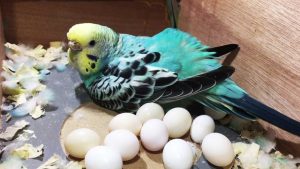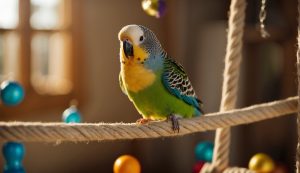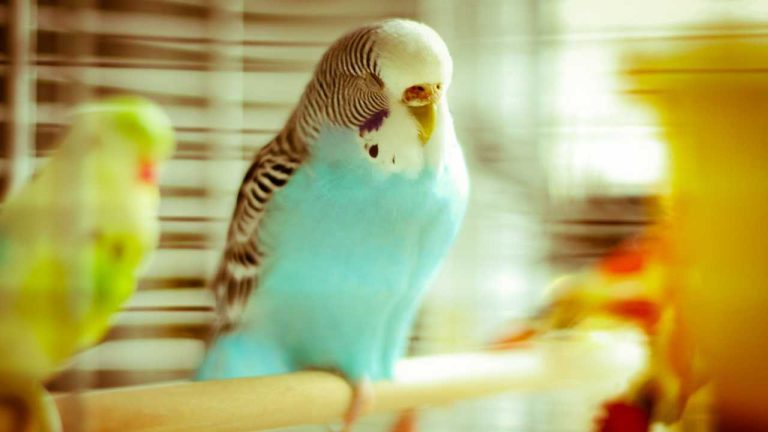Why Is My Parakeet Quiet? – Understanding Your Bird’s Silent Moments

Parakeets are known for their social chatter and engaging vocalizations. However, they can sometimes behave out of character by becoming quiet.
Understanding the nuances of parakeet behavior is crucial in deciphering why a usually vocal bird might suddenly become silent.
There are several reasons a parakeet may not be making much noise, ranging from changes in the environment, illness, or even contentment.
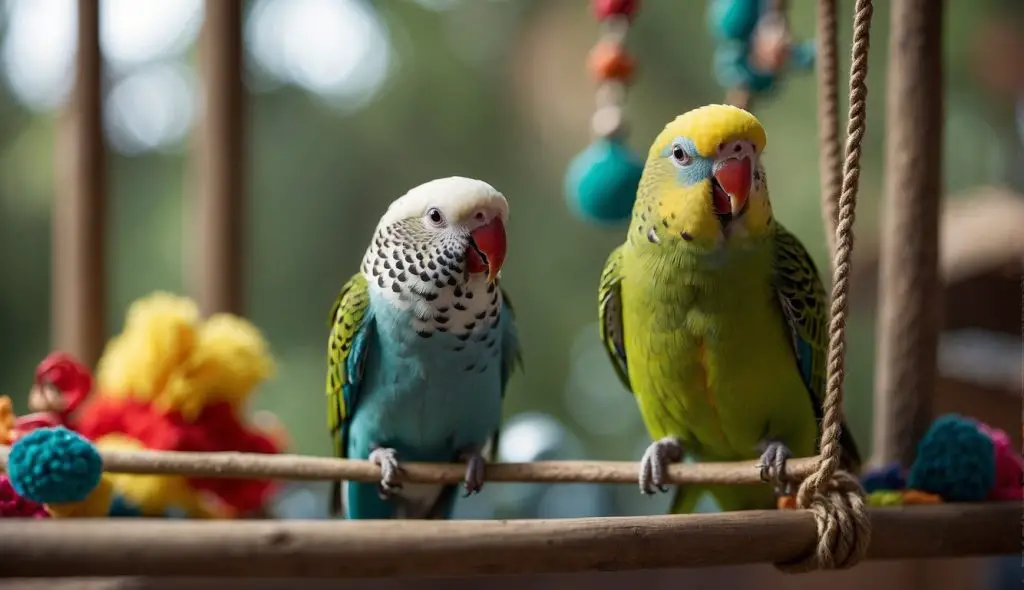
Observing my parakeet’s silent behaviors along with other cues can help determine if their quietness is a result of a serene and happy life or if it signifies something more concerning.
A shift in a parakeet’s sounds can also be due to the learning of new noises or could simply indicate a temporary mood. It’s essential to consider both the physical and emotional well-being of the bird as well as the influence of their living conditions.
Key Points
- Silent behavior in parakeets can be due to various factors including health, environment, and mood.
- A quiet parakeet necessitates careful observation to determine the cause and ensure it is not health-related.
- Changes in noise levels can also reflect a bird’s contentment or a phase of learning new sounds.
Table of Contents
Understanding Parakeet Behavior
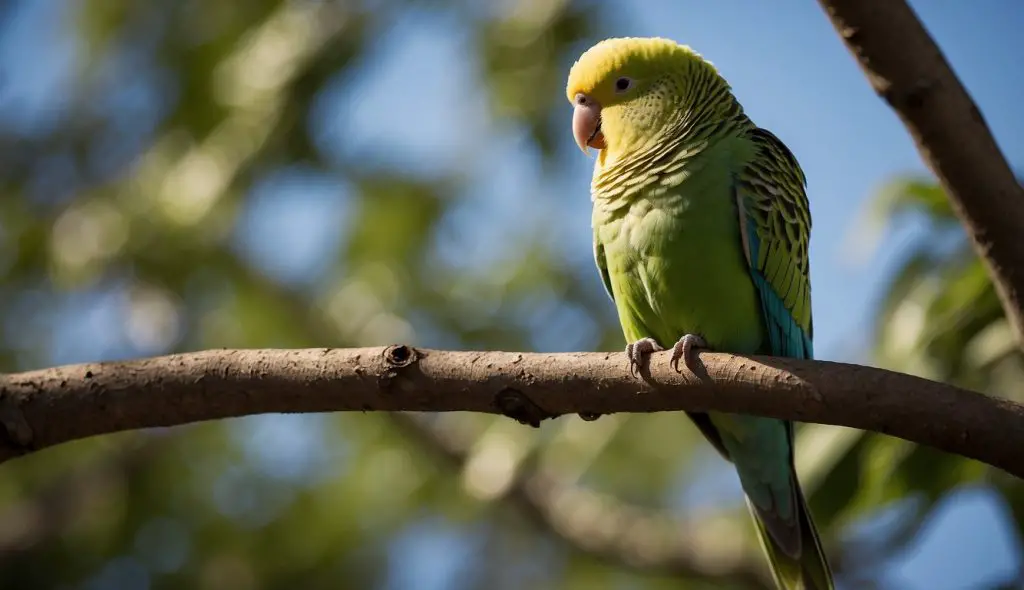
I’ve noticed that understanding parakeet behavior is essential to interpreting their health and well-being. Their behavior, particularly their vocalizations, can be indicative of their mood and comfort.
Common Behaviors and Vocalizations
Parakeets are social creatures known for their lively vocalizations, which include chirping and singing. These sounds are ways for them to communicate, not only with other birds but with humans as well. A parakeet’s vocal range varies and may consist of:
- Chirping: A sign of contentment or a form of casual communication.
- Singing: Often exhibited in males, singing can indicate happiness or a display of courtship.
- Quiet Times: Parakeets may also have periods of silence, which is normal, especially during sleep or rest.
I have seen that a consistent pattern of chirping and singing throughout the day typically suggests a parakeet is happy and healthy.
Signs of a Comfortable and Happy Bird
Parakeets display certain behaviors when they are comfortable and happy in their environment:
- Feeding: A parakeet that eats regularly shows contentment.
- Preening: Grooming or preening feathers is a positive sign.
- Resting: Lying still and relaxed, often on one leg or tucked into a cozy place.
- Quiet Presence: A quiet but alert parakeet can imply contentment.
In my experience, a happy parakeet will often be quietly observant after a feeding session, indicating a state of relaxation and satisfaction.
When Your Parakeet Is Silent
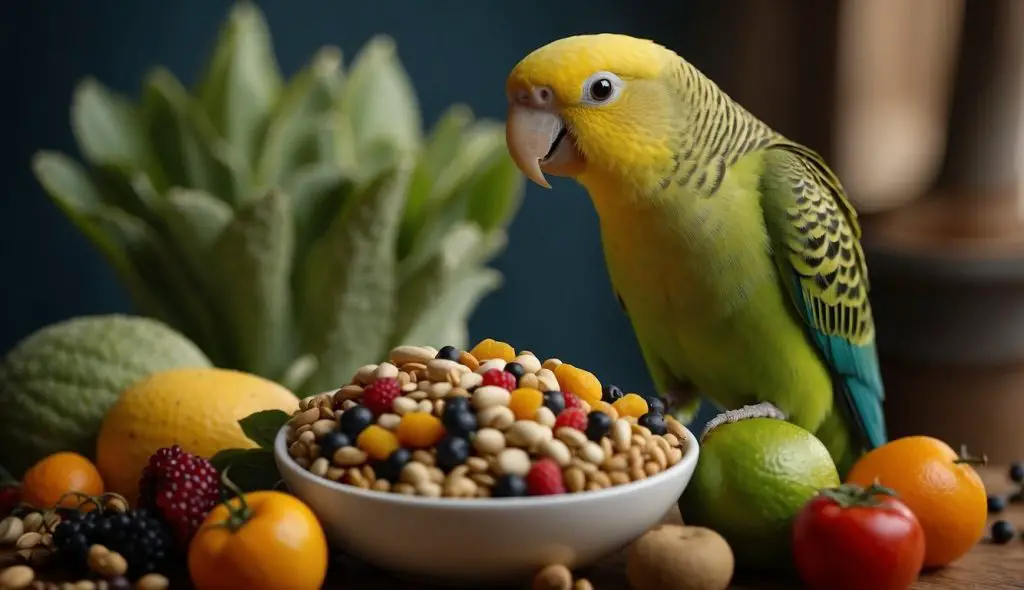
Sometimes when my parakeet is unusually silent, it’s a sign that something’s not quite right. Understanding why my feathered friend is quiet helps me address any issues promptly.
Reasons Behind a Quiet Parakeet
Stress or Fear: My parakeet might turn quiet if it feels stressed or scared. Common causes of stress include a change in environment, loud noises, or the presence of a new pet.
- Threatened: If my bird feels threatened, it may choose silence as a defense mechanism.
- Illness: A quiet parakeet could indicate that it’s not feeling well. Watch for other signs of distress or changes in behavior.
Comfort and Safety: Sometimes, my parakeet might just be calm and content. If the environment is safe and comfortable, silence can be a sign of relaxation.
- Withdrawal: After a fright or trauma, my parakeet might withdraw and remain silent as it recovers.
Addressing Changes in Behavior
Observation: I always start by carefully observing my parakeet for any additional signs of fear or illness that might require veterinary attention.
- Create a Safe Space: Ensuring the cage is in a quiet, calm area where my parakeet feels secure can help mitigate its fear.
- Routine: Establishing a consistent routine reduces stress and helps my parakeet feel more at ease.
Interaction: Gentle and regular interaction can help foster a sense of safety, assuring my parakeet that there’s no threat.
Health and Illness
When my parakeet becomes quiet, it might be a red flag indicating a health issue. I always pay close attention to such changes, as they may require prompt medical attention from an avian vet.
Recognizing Signs of Illness
I’ve learned that sudden quietness isn’t the only sign my parakeet may be unwell. Other signs of illness might include:
- Changes in appearance: Ruffled feathers, swelling, or anything out of the ordinary.
- Behavioral shifts: Lack of singing, not playing, or a reduced appetite.
- Discharges: Any unusual discharge from the nose, eyes, or mouth.
Here’s a quick reference table I use:
| Sign of Illness | What to Observe |
|---|---|
| Change in Vocalization | More quiet than usual, no singing |
| Feather Appearance | Ruffled, fluffed up, loss of sheen |
| Behavioral Changes | Less playful, lethargic, no interaction |
| Discharges | From eyes, nose, or mouth |
| Droppings | Changes in color, consistency, frequency |
The Importance of an Avian Vet
When it comes to treatment, I trust my avian vet implicitly. These specialists understand bird health intricately and can offer treatments tailored to my parakeet. Here’s why their role is crucial:
- They are trained to spot the nuances of bird illnesses.
- They offer treatments that general vets may not be aware of for birds.
Environmental Factors and Care
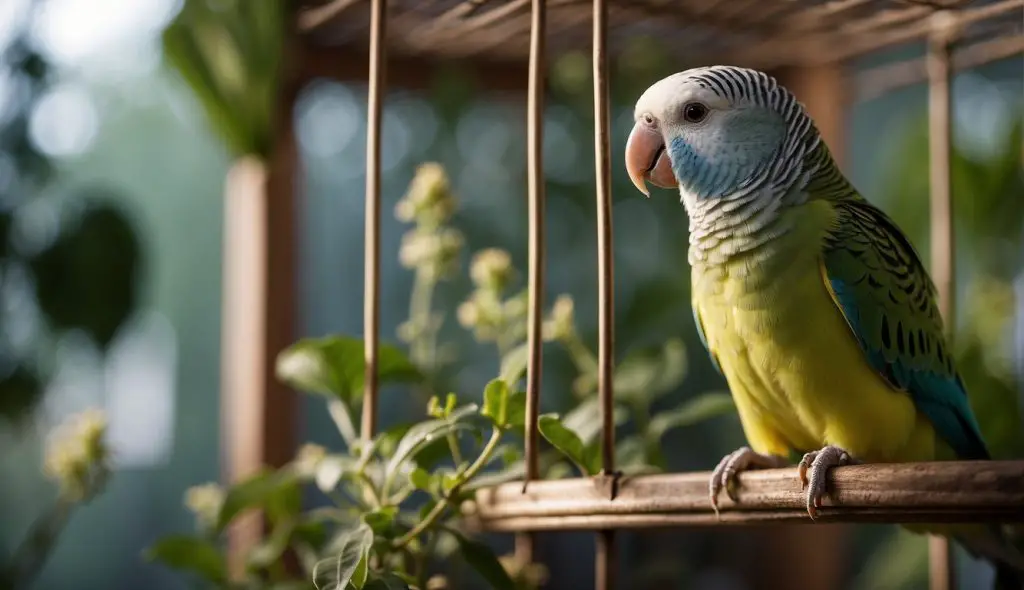
When I first brought my parakeet home, I learned that their behavior is greatly influenced by their environment and the care they receive. It’s crucial to address these factors to ensure their well-being and happiness.
Creating a Comfortable Habitat
My parakeet’s comfort hinges on replicating his natural habitat to a certain extent. Lighting and temperature are critical; I keep his cage in a well-lit area, but out of direct sunlight, and maintain a cozy room temperature since extreme temperatures can be stressful for him. To prevent him from getting startled, I introduced him to new surroundings gradually.
- Cage Placement: Away from drafts, not in direct sunlight, and at eye level to make him feel safe.
- Bedding: Clean, non-toxic, and comfortable for him to rest and play.
Effects of Diet and Nutrition
My parakeet’s quietness can sometimes be attributed to his diet. Parakeets need a variety of foods for their health, so I feed mine a balanced mix of seeds, pellets, and fresh fruits and veggies. Proper nutrition ensures his energy levels are up and he’s inclined to be more vocal.
- Seeds and Pellets: A mix of high-quality seeds and pellets should be the base of their diet.
- Fresh Produce: Incorporating vegetables and fruits in moderation to provide essential vitamins.
Importance of Exercise and Play
Having noticed my parakeet’s need for physical activity, I make sure he has plenty of toys to engage with and room to fly. Exercise and play are vital for his mental and physical health, reducing the chances of him being quiet due to boredom or discomfort.
- Toys: Rotating a variety of toys to keep him stimulated, including chew toys, bells, and mirrors.
- Out-of-Cage Time: Ensuring daily supervised time out of the cage to explore and stretch his wings.
Socialization and Bonding
When my parakeet becomes quiet, I consider its need for companionship and my relationship with it. Socialization and forming a strong bond are crucial, as they help build trust and provide necessary interaction for my bird’s well-being.
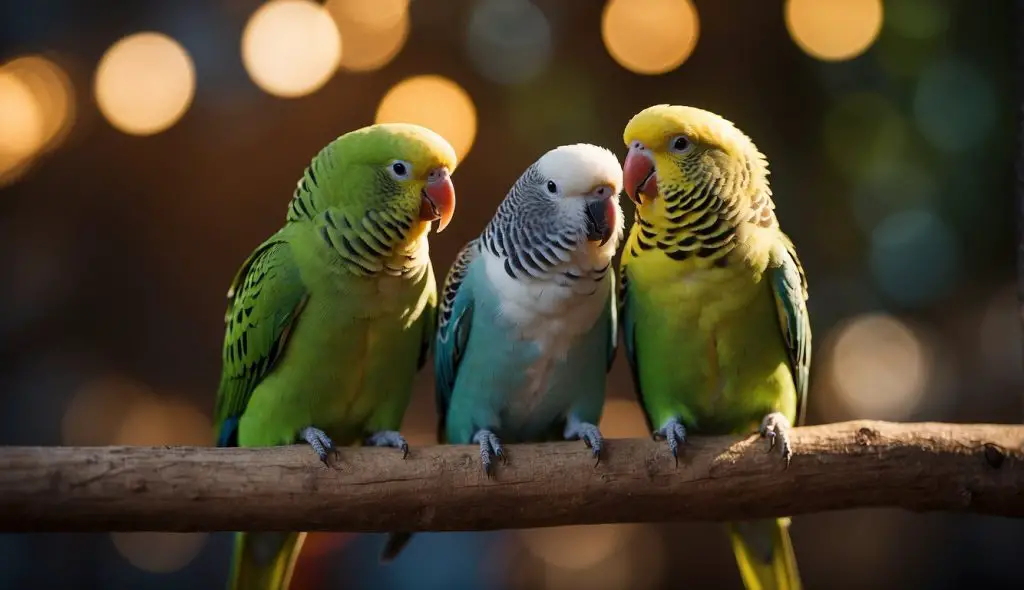
Building Trust with Your Bird
To begin, I make sure to approach my parakeet calmly and give it time to become comfortable with my presence. I offer treats from my hand to show that I’m a friend, not a threat. This daily interaction is essential to establish love and trust between us.
The Need for Social Interaction and Company
I understand that parakeets are social creatures requiring interaction. To meet their need for company, I spend quality time every day engaging with my bird. If I’m considering getting more parakeets, I keep in mind that they should be introduced slowly to ensure compatibility and prevent any territorial disputes.
Frequently Asked Questions
In this section, I’ll be addressing some of the concerns parakeet owners may have when their feathered friends exhibit quiet behavior.
What could cause my parakeet to become suddenly quiet?
If my parakeet becomes suddenly quiet, it might be due to environmental changes, stress, or feeling unwell. Sudden silence can be a sign that something is not right, and I pay close attention to any additional symptoms.
Is it normal for a budgie to be quiet and puff up its feathers?
Yes, budgies often puff up their feathers to keep warm or when they’re trying to relax. However, if my budgie is consistently puffing up and quiet, it could indicate illness, and I monitor for any signs of disease or distress.
Why might my budgie seem lethargic and sleep more than usual?
When my budgie seems lethargic and sleeps more than usual, it could be a sign of illness or malnutrition. I ensure that my budgie always has access to a balanced diet and watch for other health indicators.
What does it indicate if my budgie is sitting still and not moving much?
If my budgie is sitting still and not moving much, it might be in discomfort or unwell. Budgies are typically active, and decreased movement warrants closer observation and possibly a veterinary consultation.
Could there be a reason why my parakeet is quiet and appears to be shaking?
Yes, if my parakeet is quiet and shaking, it could be experiencing fear, stress, or even illness.
It’s vital to assess the environment for stressors and consult a vet if the shaking persists or is accompanied by other troubling signs.
What are common signs that a budgie might be unwell or in distress?
Common signs that a budgie is unwell or in distress include changes in vocalization, appetite, and behavior.
I look for symptoms such as fluffed-up feathers, discharge from the nose or eyes, and changes in droppings. These signs can indicate health issues.


